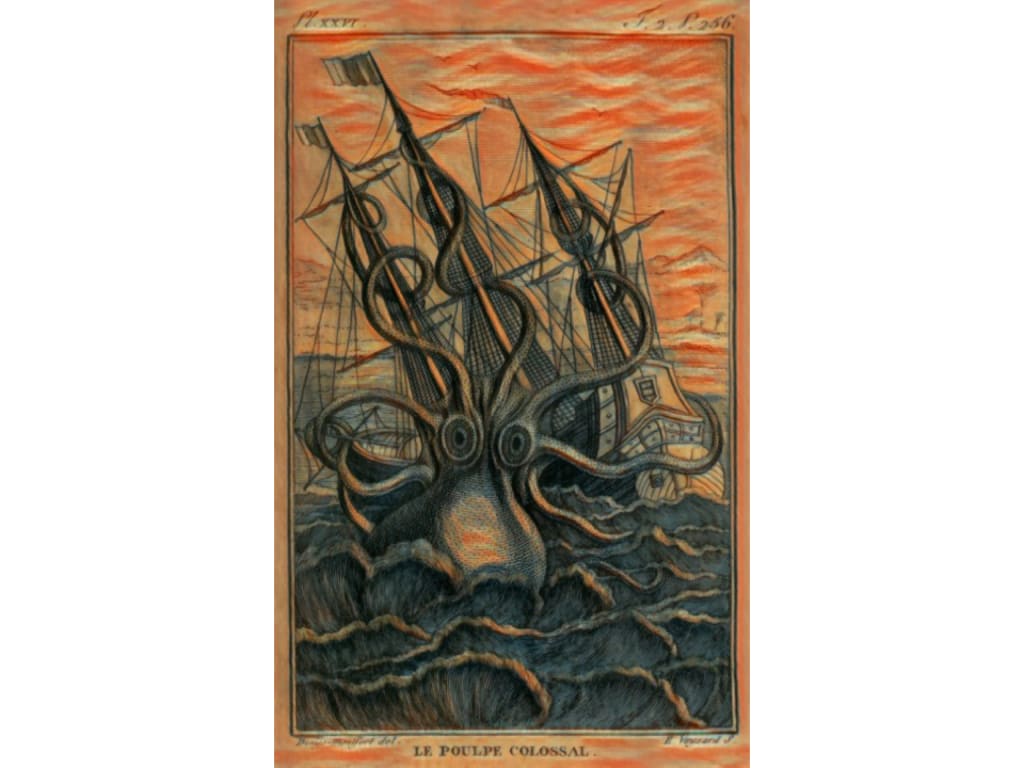Release the Kraken: A Deep Dive into the Legendary Sea Monster
The Reason I’m Afraid of Deep Water

In the vast, uncharted waters of the world's oceans lurk countless mysteries, from sunken treasures to forgotten shipwrecks. But perhaps no maritime enigma has captured our collective imagination quite as much as the legendary Kraken. This gigantic cephalopod has terrorized sailors for centuries, inspiring fear, awe, and a whole lot of tall tales. So grab a cup of grog, me hearties, and let's dive into the deep, dark depths of Kraken lore.
A Brief History of the Kraken
The Kraken first slithered into the annals of history in the 13th century, when a Norwegian king named Sverre Sigurdsson proclaimed that a colossal sea monster had attacked his fleet. Clearly, this was a solid PR move, because nothing says "I'm a badass" like surviving a run-in with a tentacled beast the size of an island.
Over the centuries, the Kraken continued to make appearances in various myths and legends, usually involving sailors who were definitely not exaggerating about their harrowing encounters. In fact, the Kraken became so famous that it even earned a mention in Carl Linnaeus's 1735 work, "Systema Naturae," the first serious attempt at classifying all living things. But alas, the Kraken didn't make the cut for later editions, presumably because Linnaeus realized he'd been duped by the fish story to end all fish stories.
The Kraken Takes Hollywood
Like any good monster, the Kraken eventually found its way onto the silver screen. Perhaps the most famous cinematic depiction of the Kraken comes from the 1981 film "Clash of the Titans," in which the creature is unleashed upon the city of Joppa as punishment for Princess Andromeda's hubris. This iconic scene gave us the immortal line, "Release the Kraken!" which has been used by countless wannabe sailors ever since.
Of course, Hollywood couldn't resist the allure of a tentacled terror, and the Kraken has appeared in numerous other films, including "Pirates of the Caribbean: Dead Man's Chest" and the 2010 "Clash of the Titans" remake. In each of these movies, the Kraken is portrayed as an unstoppable force of nature, capable of bringing even the mightiest ships to their knees. And let's be honest, who doesn't love a good undersea monster mash?
The Science Behind the Myth
As much as we'd like to believe in a sea monster with a penchant for snacking on ships, the Kraken is most likely the result of sailors' overactive imaginations (and perhaps a few too many swigs of rum). However, that's not to say there isn't a nugget of truth behind the legend.
In fact, many cryptozoologists (yes, that's a real thing) believe that the Kraken could be based on actual sightings of giant squids, which can grow up to 43 feet long and have been known to engage in epic battles with sperm whales. These deep-sea dwellers are elusive creatures, rarely seen by humans and often found washed up on remote beaches, which only adds to their mystique.
But before you go dismissing the Kraken as nothing more than a glorified calamari, it's worth noting that there are some tantalizing clues that suggest a larger, more terrifying cephalopod may be lurking in the depths of the ocean. For example, in 2016, a team of researchers discovered a massive, 120-foot-long squid carcass floating off the coast of Indonesia. While this specimen turned out to be a hoax, it does raise the question: Just how big can these creatures get?
The Kraken in Popular Culture
The Kraken's status as a legendary sea monster has ensured its place in the pantheon of popular culture. From literature and film to video games and music, the Kraken has become a symbol of the unknown, the terrifying, and the downright bizarre.
In literature, the Kraken makes an appearance in Jules Verne's "Twenty Thousand Leagues Under the Sea," where Captain Nemo encounters a monstrous squid that nearly destroys his submarine, the Nautilus. The creature also shows up in Herman Melville's "Moby-Dick," where it's described as a "vast pulpy mass" with "innumerable long arms radiating from its center." Clearly, 19th-century authors had a thing for tentacled terrors.
In the world of video games, the Kraken often serves as a boss battle, testing players' mettle against a fearsome, multi-armed foe. Titles like "Final Fantasy," "World of Warcraft," and "Sea of Thieves" all feature Kraken-inspired creatures, proving that gamers just can't resist the allure of a good sea monster showdown.
In Conclusion
Whether you believe in the existence of the Kraken or dismiss it as a maritime myth, there's no denying the enduring appeal of this legendary sea monster. From ancient legends to modern pop culture, the Kraken has captivated our imaginations and fueled our fears of the unknown depths of the ocean.
So the next time you find yourself gazing out at the vast expanse of the sea, spare a thought for the Kraken. After all, who knows what might be lurking just beneath the surface, waiting for the perfect moment to pull you under?
About the Creator
Heather N King
Meet the mistress of words who weaves tales that transport you to other worlds. With a unique perspective and a gift for storytelling, my writing will leave you spellbound and craving more.
Reader insights
Outstanding
Excellent work. Looking forward to reading more!
Top insights
Easy to read and follow
Well-structured & engaging content
Excellent storytelling
Original narrative & well developed characters
Expert insights and opinions
Arguments were carefully researched and presented
Eye opening
Niche topic & fresh perspectives
Heartfelt and relatable
The story invoked strong personal emotions
On-point and relevant
Writing reflected the title & theme






Comments (3)
interesting read and enjoyed the legend, maybe there is some truth
You know like how in deserts, people are fooled by mirages. Maybe the Kraken is some kinda sea mirage, lol. But I would really love for it to actually exist!
And another good one Heather. Isn't Charybdis an ancestor of the Kraken? I got that idea from somewhere, but I can't quit recall where exactly. Might have to reread "The Odyssey" one of these days.